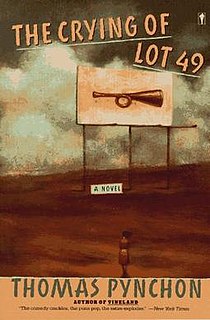
If you've looked into postmodernist literature at all, odds are good that you've run into the name of author Thomas Pynchon. And once you've done that, "The Crying of Lot 49" is bound to come up on your radar in conjunction. It was not the first Pynchon novel that I've read (that would be "Gravity's Rainbow") but it seems to be a popular postmodernist starter because it's quite short: only 152 pages in the paperback edition.
But this strange, unassuming little novel packs a whole lot of punch. The entire thing is one big metaphorical curve ball, made up entirely of intricately interwoven details that are devilishly easy to overlook, resulting more often than not in crossed eyes and a strong urge to pull out your own hair by the fistful. It's the seemingly unimportant, mundane things that the reader finds unite the entire story and pull us deeper down the paranoid rabbit hole that this book is.
While I have read this book multiple times, I wouldn't necessarily say that it's enjoyable. The only people who seem to genuinely like it most of the time are English majors and people who claim to have read it but really bought it just because it looks sophisticated on their bookshelf. Sometimes these people are one and the same. But this select (pseudo-)audience isn't a result of bad writing or pointless metatextual spiraling. On the contrary, all the possibly nonsensical layers are a part of what makes Pynchon's writing so incredibly interesting. When you make a connection, unlock a subtle little secret in the text, you feel like you as a reader have accomplished something nearly as important to the story being written and published was.
Part of why nobody "likes" this and other Pynchon titles much of the time is just that his writing isn't easy to digest. It isn't the sort of paperback that most people curl up with on a rainy afternoon and enjoy over a cup of hot tea. And so unless one is making a deliberate effort to make one's way through this novel, nobody reads "The Crying of Lot 49." I think this is a shame. And half the people with whom I've spoken about it have already decided not to read it without even picking it up, just because its reputation can be intimidating.
The big difference I see here between people who read Pynchon (overwhelmingly English majors and postmodern enthusiasts) and those who don't is that people who work in and around the field of English have been deliberately taught how to read dense and intricate writing like that in "The Crying of Lot 49." We've been painstakingly instructed on how to dissect a text, layer by layer, and it does indeed involve real work instead of just reading the text once and deciding that it "doesn't make any sense."
Perhaps if more people were taught or sought out methods for reading and understanding complex texts like Pynchon's, readers wouldn't be so intimidate of books like "The Crying of Lot 49." If you're interested in taking on a literary challenge like this but don't know where to begin trying to take it apart, here are some quick tips and approaches that I personally find helpful:
1. Keep a running list of characters' names and who they are. Leave some open space underneath your initial entry so that you can expand on their relationships to other characters, because many of the names in "The Crying of Lot 49" contain their own little jokes and ironies. They fade in and out of the larger story without reintroductions.
2. When you start to observe recurring themes or key words and phrases, bookmark them with a sticky note or arrow. Being able to flip back and forth to compare the contexts directly will be immensely helpful!
3. Write down your own thoughts, questions, and interpretations as you encounter them. They needn't be coherent; after all, the text doesn't seem overly concerned with that most of the time. I personally find that actively wild speculation is the best way to keep my brain wide open to receive (and perceive) information from the book, especially when it's a complicated one.
When we make a conscious effort to stretch our brains with books like "The Crying of Lot 49" I honestly believe that we expand our mental horizons and broaden our ways of thinking. You don't have to enjoy a book to get something out of it. In all honesty most of the books that I read for class are not ones that I would choose to read of my own accord had I been let loose and told to pick something that I "liked." But I can honestly say that I have gained some insight, some new perspective, from each of them for which I find good use and am grateful. That's why it's important to read beyond pleasure, to read for more than entertainment. I hope that these basic tips will help to give you the encouragement you need to pick up something that has perhaps intimidated you in the past and give it a try. If you do, please let me know! I'd love to hear about your experience.
No comments:
Post a Comment